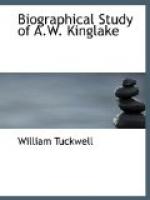On the other hand, the “Saturday Review,” then at the height of its repute and influence, vindicated in a powerful article Kinglake’s truth and fairness; and a pamphlet by Hayward, called “Mr. Kinglake and the Quarterlies,” amused society by its furious onslaught upon the hostile periodicals, laid bare their animus, and exposed their misstatements. “If you rise in this tone,” he began, in words of Lord Ellenborough when Attorney-General, “I can speak as loudly and emphatically: I shall prosecute the case with all the liberality of a gentleman, but no tone or manner shall put me down.” And the dissentient voices were drowned in the general chorus of admiration. German eulogy was extravagant; French Republicanism was overjoyed; Englishmen, at home and abroad, read eagerly for the first time in close and vivid sequence events which, when spread over thirty months of daily newspapers, few had the patience to follow, none the qualifications to condense. Macaulay tells us that soon after the appearance of his own first volumes, a Mr. Crump from America offered him five hundred dollars if he would introduce the name of Crump into his history. An English gentleman and lady, from one of our most distant colonies, wrote to Kinglake a jointly signed pathetic letter, intreating him to cite in his pages the name of their only son, who had fallen in the Crimea. He at once consented, and asked for particulars—manner, time, place— of the young man’s death. The parents replied that they need not trouble him with details; these should be left to the historian’s kind inventiveness: whatever he might please to say in embellishment of their young hero’s end they would gratefully accept.
Unlike most authors, from Moliere down to Dickens, he never read aloud to friends any portion of the unpublished manuscript; never, except to closest intimates, spoke of the book, or tolerated inquiry about it from others. When asked as to the progress of a volume he had in hand, he used to say, “That is really a matter on which it is quite out of my power even to inform myself”; and I remember how once at a well-selected dinner-party in the country, whither he came in good spirits and inclined to talk his best, a second-hand criticism on his book by a conceited parson, the official and incongruous element in the group, stiffened him into persistent silence. All England laughed, when Blackwood’s “Memoirs” saw the light, over his polite repulse of the kindly officious publisher, who wished, after his fashion, to criticise and finger and suggest. “I am almost alarmed, as it were, at the notion of receiving suggestions. I feel that hints from you might be so valuable and so important, it might be madness to ask you beforehand to abstain from giving me any; but I am anxious for you to know what the dangers in the way of long delay might be, the result of even a few slight and possibly most useful suggestions. . . . You will perhaps (after what I have said)




